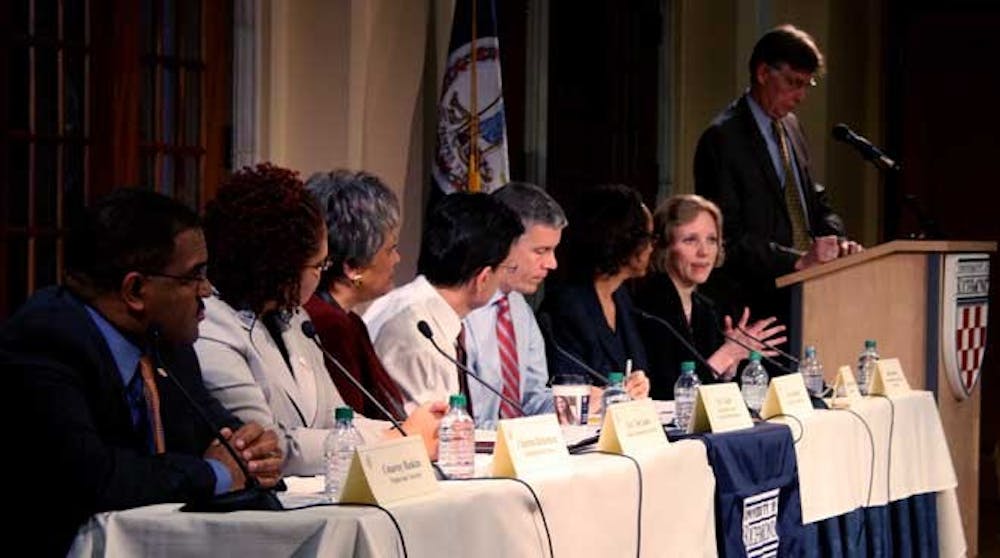"A college degree is the answer to closing that opportunity gap and we've got to make a national priority of affordability," U.S. Rep. Eric Cantor (R-VA) said at the Roundtable Discussion on Higher Education held at University of Richmond Friday night.
At the discussion, seven panelists discussed ways to improve American higher education through college accessibility and affordability, transparent use of tuition dollars and clarity in the value of a college degree.
"I think we need transparency all the way through the process, which means breaking down tuition costs, where they end up, how much of it goes to academics, how much of it goes elsewhere, how students' success is measured," Cantor said.
In addition to Cantor, the panel included Arne Duncan, secretary of education; Kimberly J. Robinson, a professor at University of Richmond School of Law; Kate Lawrenz, a Truman Scholar and a senior at Richmond; Kay Coles James, a member of the board of trustees at Virginia Commonwealth University; Charleita Richardson, the CEO of Parternship for the Future; and Conaway Haskins, the executive director of government and external affairs at Virginia State University.
Steve Allred, provost and vice president for academic affairs, moderated the event.
"I think our young people here are as smart, as talented, as creative, as entrepreneurial as children anywhere in the world," Duncan said. "I just want to give you a chance to compete on a level playing field and right now we're not where we need to be on any of these measures."
The "you" that Duncan referred to was the panel's audience, which included students from Swift Creek Middle School in Midlothian.
Duncan said the United States' college completion rate had stagnated when compared with other countries around the world and that this stagnation would lead employers to seek out more educated countries for job opportunities.
According to a 2012 report from the College Board, the United States is currently 14th in the number of college graduates per country when compared with the rest of the world. Duncan said his goal was for the United States to lead the world in the college graduation rate by 2020. Both Duncan and Cantor noted the increase in college tuition in the United States as an added difficulty to completing a college degree.
"It's a time when more and more young folks have to graduate from college, but it's harder to do that financially," Duncan said.
According to the College Board, the average cost of tuition, fees and room and board at public four-year institutions has increased 92.3 percent since 1971, and the same average costs have increased 92.8 percent at private four-year institutions.
"We've got a lot of work to do if we're going to keep college accessibility at the point where every American can feel that they can access higher education," Cantor said.
Enjoy what you're reading?
Signup for our newsletter
Cantor said he had come to the panel looking for ideas to take back to Washington, knowing that the Higher Education Act, the law that determines how federal dollars are given to colleges and students, is up for reauthorization in 2014.
"The reauthorization of the Higher Education Act will really give an opportunity to reform a lot of the issues that we were talking about," Lawrenz said after the discussion.
One of Lawrenz's suggestions for improvement in higher education was for more colleges to provide data to prospective students on the outcome of graduates in many types of majors.
"I think the way that we do not want to go as a country is creating various ranking systems that emphasize what is or is not a good college experience," Lawrenz said.
She said she wanted to see students with a variety of career goals have access to information that helps them decide which college would be the most valuable for the career they wish to pursue.
"It may be that you want to pursue a line of career that is in public service," Cantor said, "and that's not necessarily going to translate into more dollars, but it can be just as valuable to you or the community."
Contact reporter Brennan Long at brennan.long@richmond.edu
Support independent student media
You can make a tax-deductible donation by clicking the button below, which takes you to our secure PayPal account. The page is set up to receive contributions in whatever amount you designate. We look forward to using the money we raise to further our mission of providing honest and accurate information to students, faculty, staff, alumni and others in the general public.
Donate Now



